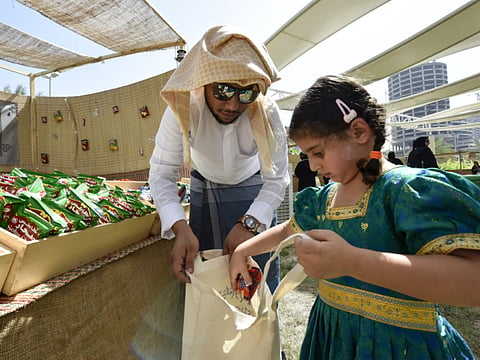It’s not Halloween, it’s Hag Al Laila for Emirati children
Children go knocking on their neighbours’ doors, asking for sweets and treats before Ramadan

Dubai
Children across the UAE will take to the streets of their neighbourhoods on Wednesday night knocking on doors and calling out ‘Atoona Hag Al Laila”, which means “Give us sweets for tonight”.
The practice which comes at this time, however, is not Halloween’s famous tradition for trick or treating. Emirati children are celebrating a hundreds of years old tradition to mark the arrival of Ramadan, known as Hag Al Laila.
The annual event, which means ‘For this Night’, is one of the Emirati traditional celebrations in the middle of Sha’aban, the eighth month of the Islamic Hijri calendar, which sees children going from door-to door to sing and collect sweets and treats from neighbours, who have been preparing for the occasion throughout the week.
In preparation for the day, many families throng groceries and shops that sell traditional sweets and nuts before welcoming visiting children.
Other than celebrating, the purpose of the event is to educate the public about the occasion and the month of Ramadan and promote the values of sharing and giving.
Mansour Al Hashemi, a 24-year-old Emirati said it was not very long ago when he last went around knocking on their neighbours doors asking for sweets, but now that he no longer does it, he watches his 11-year-old sibling do it every year.
“The Hag Al Laila celebrations originated hundreds of years ago and was carried down from one generation to the next in the same fashion. Typically, when I was younger I used to visit homes within my neighbourhood singing a traditional song ‘Atoona Allah yaa’teekoum bet Makah yewadeekoum,’ which means ‘Give to us and God will give to you, and, with His grace, you will visit Makkah’,” he said.
Al Hashemi said he has very fond memories of the celebration. “Now that I’m older, I buy traditional sweets and snacks for other children who will be visiting us, including gum, chips and chocolates.”
The tradition is also celebrated across the Muslim community but is referred to by different names. In Qatar it is called Garangao; in Bahrain it is called Gergaoon; in Oman it is called Garangesho, and in Kuwait and Saudi Arabia, it is called Gargean.
Abdullah Barahim, 25-year-old Yemeni who was born and raised in an Emirati neighbourhood, said he expects many children to come ringing their bell asking for sweets after 4pm.
“Many families like to make the treats ready a couple of days earlier before the kids show up,” he said. Every year during this month, we prepare small mini bags with different sweets, including lollipops, small chocolate bars and gum to give the children,” he said.
The last time he celebrated it he was 15, he said. “There was a lot of excitement when we did it as kids, and now I can see the excitement through the eyes of the kids who come ringing our bells.”
To mark Hag Al Laila and raise awareness of the UAE’s traditions, entities across Dubai and Sharjah are holding a number of events for the celebration.
Noor Bank, for example, will be donating some money to the Rashid Centre for Disabled towards the occasion, so that those in the centre are able to relive these important Emirati traditions and legacies.
Sharjah Maritime Museum and Al Hisn Museum at Sharjah Fort are staging a wide variety of interactive activities based on the traditions and culture of Hag Al Leila.
Souq Al Jubail also celebrated Hag Al Leila at the Sharjah Maritime Museum with approximately 50 special needs children in attendance from Sharjah City for Humanitarian Services.
Box:
What is Hag Al Laila
Hag Al Laila, which means ‘For this Night’, is an annual occasion in the middle of Sha’aban, the eighth month in the Islamic Hijri calendar. As per tradition, people in the UAE prepare for the arrival of Ramadan two weeks in advance in mid-Sha’aban. In the late afternoon, children go knocking on their neighbours’ doors to collect sweets, nuts and treats.
Sign up for the Daily Briefing
Get the latest news and updates straight to your inbox



